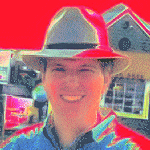Alan Kay on the State of Computing Today

Interview with Alan Kay
Stuart Feldman, ACM Queue 2:9:20-30, Dec 2004/Jan 2005
Alan is well known as the inventor of Smalltalk, not to mention leading his lab at Xerox Parc which invented the mouse, the graphical user interface, the ethernet, the laser printer, and virtually all the stuff that forms the basis of modern personal computing. In addition to winning the Turing Award, Kay recently received the Draper Prize from the National Academy of Engineering and Kyoto Prize in Advanced Technology.
Alan Kay: For a Scientific American article 20 years ago, I came up with a facetious sunspot theory, just noting that there's a major language or two every 10 1/2 years, and in between those periods are what you might call hybrid languages...
Perhaps it was commercialization in the 1980's that that killed off the next expected new thing. Our plan and our hope was that the next generation of kids would come along and do something better than Smalltalk around 1984 or so... One could actually argue--as I sometimes do--that the success of commercial personal computing and operating systems has actually led to a considerable retrogression in many, many respects.
You could think of it as putting a low-pass filter on some of the good ideas from the '60s and '70s, as computing spread out so much, much faster than educating unsophisticated people can happen. In the last 25 years or so, we actually got something like a pop culture, similar to what happended when television come on the scene and some of its inventors thought it would be a way of getting Shakespeare to the masses. But they forgot that you have to be more sophisticated and have more perspective to understand Shakespeare...
So I think the lack of a real computer science today, and the lack of real software engineering today, is partly due to this pop culture.




0 Comments:
Post a Comment
<< Home